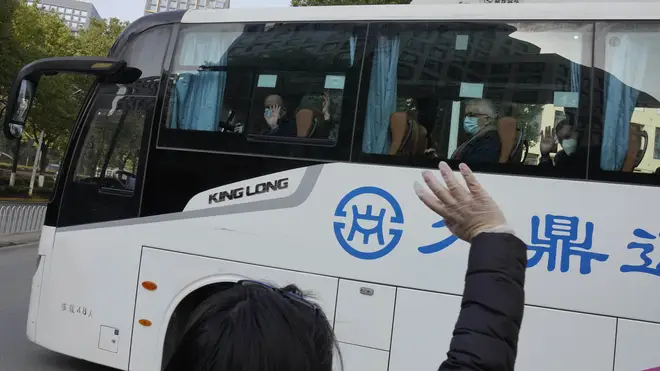
Henry Riley 4am - 7am
28 January 2021, 17:44

The mission has become politically charged as China seeks to avoid blame for alleged missteps in its early response to the outbreak.
A World Health Organisation team has emerged from quarantine in the Chinese city of Wuhan to start a fact-finding mission on the origins of the virus that caused the Covid-19 pandemic.
The researchers, who were required to complete 14 days in quarantine after arriving in China, left their quarantine hotel and boarded a bus in the afternoon.
The mission has become politically charged as China seeks to avoid blame for alleged missteps in its early response to the outbreak.
A major question is where the Chinese side will allow the researchers to go and who they will be able to talk to.
Yellow barriers blocked the entrance to the hotel, keeping the media at a distance. Before they boarded, workers in full protective gear could be seen loading their luggage on to the bus, including two musical instruments, a dumbbell and four yoga mattresses.
Hotel staff waved goodbye to the researchers, who were wearing face masks. The bus driver wore a full-body white protective suit. They drove about 30 minutes to a lakeside hotel.
Earlier this month, former WHO official Keiji Fukuda, who is not part of the team in Wuhan, cautioned against expecting any breakthroughs, saying it may take years before any firm conclusions can be made on the virus’s origin.
“This is now well over a year past when it all started,” he said. “So much of the physical evidence is going to be gone.
“The memories of people are imprecise and probably the physical layout of many places are going to be different than they were and how people are moving about and so on.”

The mission only came about after considerable wrangling between the sides that led to a rare complaint from the WHO that Beijing was taking too long to make final arrangements.
China, which has strongly opposed an independent investigation it could not fully control, said the matter was complicated and that Chinese medical staff were preoccupied with new virus clusters in Beijing, Shanghai and other cities.
While the WHO was criticised early on, especially by the US administration, for not being critical enough of the Chinese response, it recently accused China and other countries of moving too slowly at the start of the outbreak, drawing a rare admission from the Chinese side that it could have done better.

“The WHO and global experts have given their full affirmation of China’s epidemic prevention success and past origins tracing work,” Foreign Ministry spokesperson Zhao Lijian said. “Both sides have a basic consensus on co-operation on origins-related research, and related work is progressing smoothly.”
Chinese officials and state media have tried to cast doubt on whether the virus even started in China. Most experts believe it came from bats, possibly in south-west China or neighbouring areas of south-east Asia, before being passed to another animal and then to humans.
The origin search will try to determine where and how that happened.
The team plans to visit hospitals, laboratories and markets. Field visits will include the Wuhan Institute of Virology, Huanan market, Wuhan CDC laboratory. They will speak with early responders and some of the first #COVID19 patients. https://t.co/Owd6GEBoAj
— World Health Organization (WHO) (@WHO) January 28, 2021
WHO, which is based in Geneva, Switzerland, said late on Thursday on Twitter that its team plans to visit hospitals, markets like the Huanan Seafood Market linked to many of the first cases, the Wuhan Institute of Virology, and laboratories at facilities such as the Wuhan Centre for Disease Control.
“All hypotheses are on the table as the team follows the science in their work to understand the origins of the COVID19 virus,” WHO tweeted.
It said the team had already requested “detailed underlying data” and planned to speak with early responders and some of the first Covid-19 patients.
“As members start their field visits on Friday, they should receive the support, access and the data they need,” WHO tweeted.
The first face-to-face meetings with Chinese scientists are set to take place on Friday, before the team starts the field visits in and around Wuhan, it said.